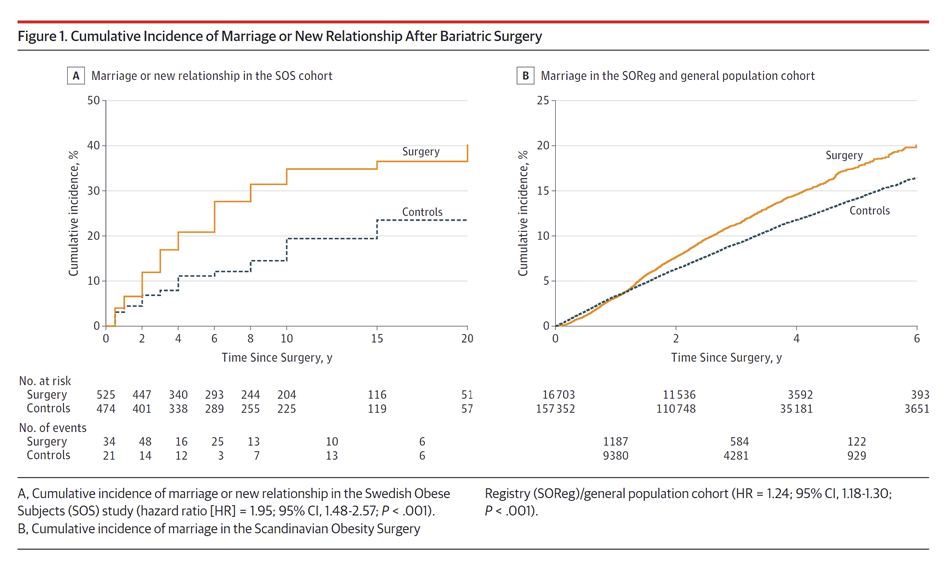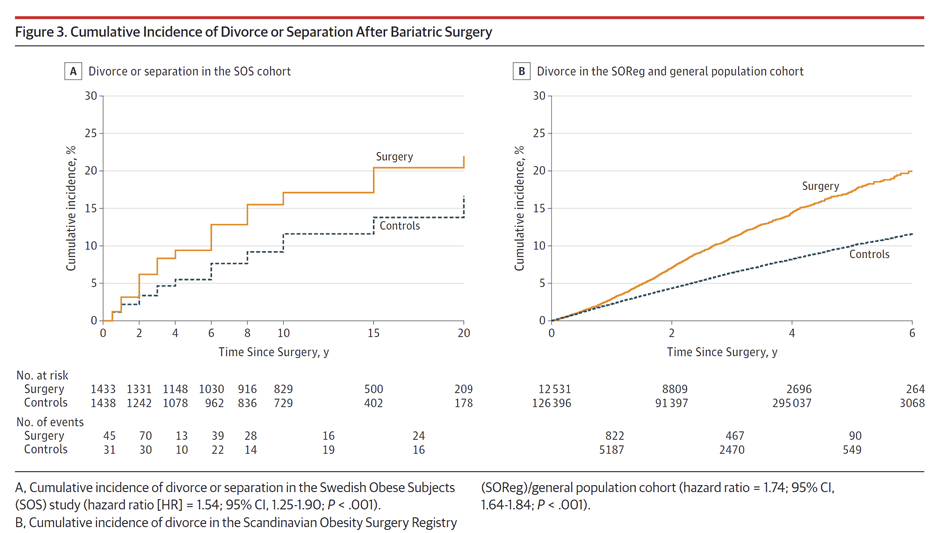
The Swedish Obesity Subjects study is one of the most important long term studies available comparing the outcomes of bariatric surgery versus no surgery for obese patients.(1)
It has helped solve key questions relating to the role of surgery in improving medical conditions and lifespan. More recently investigators examined the data to establish how personal relationships changed over time comparing patients who had undergone bariatric surgery to those who had not.
In this study approximately 30,000 individuals who underwent bariatric surgery were compared to approximately 285,000 individuals in the general community who did not.
A broad summary of results can be broken down as follows:
For individuals not already married:
- Those who were single or unmarried having bariatric surgery experienced twice as many marriages or new relationships as those who did not have a history of bariatric surgery

For individuals already married:
- For those who had a history of bariatric surgery, divorce was around 30% more common than those who had not had bariatric surgery
- After 10 years the incidence of separation or divorce was 17.1% in the bariatric surgery group versus 11.6% in the non surgery group.
Within the surgery groups, changes in relationship status were more common in those with greater weight loss.

The following discussion from the paper provides an excellent overview of some of the more common relationship related issues which may occur after bariatric surgery:
“The increased incidence of marriage and new relationship after bariatric surgery is in line with previous research showing that bariatric surgery is associated with increased quality of life, positive changes in social life, and increased romantic interest from others. These associations may be enhanced by a large weight loss and hence contribute to the observed increased incidence of marriage/new relationship.
However, for patients who are in a relationship at the time of surgery, these changes, as well as the responses of spouses/partners to these changes, may affect the dynamics of the relationship. Although most post-bariatric surgery patients and their partners report an overall maintained or increased quality in the relationship, partners of patients who have undergone bariatric surgery sometimes report feeling jealous or no longer needed. Qualitative studies of bariatric surgery point to the sense of a “joint journey” as an important part of successful weight loss and weight maintenance, but also to maintain a healthy relationship. To ensure that patients about to undergo bariatric surgery and their partners have a better chance of handling potential tensions in their relationship, they should be informed of this risk.
On the other hand, patients who have undergone bariatric surgery might be empowered to leave an unhealthy relationship. It has been suggested that bariatric surgery in patients with a poorly working marriage puts extra tension on the relationship, possibly leading to divorce. This is supported by our observations in the SOS study, in which poor family relationships before surgery was the strongest predictor of increased incidence of separation and divorce. Hence, separation or divorce after bariatric surgery should not only be interpreted as an adverse effect of the surgery but could also demonstrate that physical and psychological improvements after bariatric surgery might give patients in unhealthy relationships the confidence and self-esteem to end those relationships.”
References
1. Imbus JR, Funk LM. Relationship Status After Bariatric Surgery: It's Complicated. JAMA Surg. 2018;153(7):661-2.